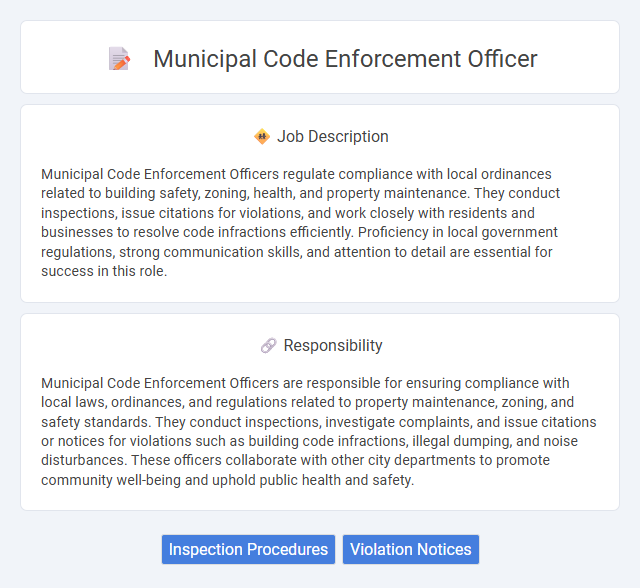
Municipal Code Enforcement Officers regulate compliance with local ordinances related to building safety, zoning, health, and property maintenance. They conduct inspections, issue citations for violations, and work closely with residents and businesses to resolve code infractions efficiently. Proficiency in local government regulations, strong communication skills, and attention to detail are essential for success in this role.
Individuals with strong attention to detail and a commitment to public safety are likely suitable for the role of a Municipal Code Enforcement Officer. People who can handle occasional confrontations and work independently while interpreting and enforcing local ordinances may fit well in this position. Those prone to stress or discomfort with enforcement responsibilities might find this job challenging.
Qualification
A Municipal Code Enforcement Officer typically requires a high school diploma or equivalent, with many positions favoring candidates who possess post-secondary education in criminal justice, public administration, or a related field. Applicants must demonstrate knowledge of local ordinances, zoning laws, and building codes alongside strong attention to detail and effective communication skills. Previous experience in law enforcement or inspection roles, coupled with the ability to handle conflict resolution and perform fieldwork, significantly enhances qualification prospects.
Responsibility
Municipal Code Enforcement Officers are responsible for ensuring compliance with local laws, ordinances, and regulations related to property maintenance, zoning, and safety standards. They conduct inspections, investigate complaints, and issue citations or notices for violations such as building code infractions, illegal dumping, and noise disturbances. These officers collaborate with other city departments to promote community well-being and uphold public health and safety.
Benefit
Municipal Code Enforcement Officers likely experience the benefit of stable employment within local government, which may include comprehensive health coverage and retirement plans. Opportunities for career advancement and professional development often improve job satisfaction and long-term earning potential. Employees in this role probably gain the advantage of contributing to community safety and quality of life, enhancing personal fulfillment and public trust.
Challenge
A Municipal Code Enforcement Officer likely faces the challenge of balancing strict regulation enforcement with community relations, as residents may resist compliance. Addressing diverse codes ranging from building safety to zoning requires continuous learning and adaptability. Navigating potential conflicts while ensuring public safety and legal standards probably demands strong communication and problem-solving skills.
Career Advancement
Municipal Code Enforcement Officers can advance their careers by gaining specialized certifications in areas such as zoning, environmental regulations, and public safety compliance, which increase their expertise and marketability. Opportunities for promotion often include senior enforcement officer, supervisor, or management positions within municipal planning or regulatory departments. Continuous professional development through workshops and training enhances officers' capabilities, making them strong candidates for leadership roles and policy-making responsibilities in local government.
Key Terms
Inspection Procedures
Municipal Code Enforcement Officers conduct thorough inspection procedures to ensure compliance with local ordinances, zoning laws, and safety regulations. They systematically evaluate properties for violations related to building codes, health standards, and environmental regulations, documenting findings with detailed reports and photographic evidence. Efficient adherence to inspection protocols facilitates timely enforcement actions, supporting community safety and regulatory compliance.
Violation Notices
Municipal Code Enforcement Officers issue Violation Notices to address non-compliance with local ordinances, ensuring community safety and order. These notices document specific infractions such as zoning violations, property maintenance issues, and illegal dumping, providing residents with precise instructions for corrective action. Promptly managing Violation Notices helps municipalities enforce regulations effectively and maintain neighborhood standards.
 kuljobs.com
kuljobs.com